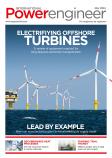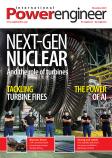Generators are investing in advanced automation solutions to keep their plants working at maximum availability and safety.
Metso has won a contract to modernise the automation and field instrumentation at Helsingin Energia's Salmisaari A and B power plants in Helsinki, Finland. The investment will ensure high availability and safety at the plants long into the future.
New automation will replace the existing automation system from 1984 at Plant B, which produces electricity and district heat, and the system from 1986 at Plant A, which produces district heat. In the future, the plants' main fuel of coal will be replaced with wood pellets. These will initially make up 5-10 per cent of the fuel mix.
Metso's extensive turnkey delivery will consist of two of its own DNA automation systems, field instrumentation, a safety interlocking system, replacement of programmable logic controls, field engineering, an emissions reporting tool to meet present directives, installation, testing and commissioning. Modernisation at Plant B has already begun with start-up planned for next year; work will begin on plant B in 2015.
Metso earlier delivered automation to Helsinki Energia's Kellosaari back-up power plant, its coal storage facility, and for its water treatment facility. All of these will eventually use a single reporting system supplied by Metso, with all power plants and processes operating from the same control room with uniform user interfaces.
As one of the largest energy companies in Finland, Helsingin Energia supplies electric energy to about 400,000 customers and meets more than 90 per cent of the district heat demands of the capital city.
Siemens has supplied 18 DCS units to Wuhan Kaidi Electric, the second biggest company in China involved in biomass power plants. Most of those new biomass plants are equipped with Siemens turbines and have an electrical output of 30 MW. As feed, they use locally abundant farm and wood waste, which supports local farmers as well as protecting the environment. The generated power is used in rural areas. The first plant, Haubei Chongyan Biomaass, has been successfully in operation since April 2012.
For the 16 newly constructed biomass power plants, Wuhan Kaidi needed a reliable supplier for the DCS for 18 units. Though the units of those biomass power plants are small, they still require a control system with essentially the same functionality as one for a regular sized plant. As the biomass power plants are mostly built in rural regions, on-site service for these locations is inconvenient and costly. Therefore Kaidi needed a reliable control system that canalso be accessed remotely.
Siemens' solution is its SPPA-T3000 DCS. The turbine control systems for the plants, which are spread apart, can be integrated into the DCS and operated via the same HMI. Furthermore, the control system automates boilers, electrical systems and water treatment - as well as the ash and dust removal and auxiliary sections of the turbines at all of the plants.
"As our new biomass power plants are built in rural areas, it is important for us that they run with a reliable control system and that we can access data from all plants at our central control room at Kaidi. SPPA-T3000 control system fulfils all these requirements," noted Zheng Tao, instrumentation and control director with Wuhan Kaidi Electric.
Hydropower control
Emerson Process Management has been awarded contracts worth nearly US$9million (EUR6.8million) to modernise the controls of multiple hydropower plants and a dispatch centre for AES Tietê in Brazil.
A subsidiary of AES Brazil, AES Tietê is the first power generator in Brazil to adopt a DCS automation architecture for its hydropower fleet. Hydropower is the predominant power source in the country, accounting for approximately 80 per cent of the power generated there.
One of the largest private producers of electricity in Brazil, AES Tietê operates a fleet of 12 hydropower plants with an installed capacity of 2658MW in the state of São Paulo. Outdated controls based on proprietary technology from a variety of vendors made it difficult for the company to find spare parts and integrate the controls with other equipment and devices, negatively impacting unit efficiency and reliability.
Emerson will install a SCADA system for AES Tietê's generation operations centre in Bauru, as well as a back-up system roughly 40 miles away at the utility's Bariri hydropower plant. Operators will use the system to monitor and control the generating units and spillways of the 12 hydropower plants located along the Rio Grande, Tietê and Pardo rivers.
As part of this system, Emerson will provide dispatch and optimisation software for generation management, which includes load scheduling, cascade control and economic dispatch. The system will also manage communication with Brazil's national electric grid operator, Operador Nacional do Sistema Elétrico (ONS). The first two hydropower plants are expected to communicate with the central dispatch centre later this year.
Agua Vermelha is AES Tietê's largest Brazilian hydropower plant, at 1.4GW (6 x 233MW). At this plant, Emerson's Ovation control system will directly control the turbine and balance-of-plant equipment and processes, including wicket gates and the cooling system. By controlling plant processes and regulating turbine speed, the Ovation system will help ensure precise frequency control and smooth synchronisation to the grid.
Emerson is also providing its Ovation Security Centre for the Agua Vermelha facility, replacing the plant's electro-mechanical controls, and supplying a CSI 6300 SIS digital overspeed protection system for the turbines.
Emerson is performing a similar controls retrofit at Barra Bonita hydropower's 36MW unit 1.
Next-generation automation
Invensys has unveiled its next-generation process automation system. With advanced tools and applications delivered across a high-speed, fault-tolerant and cyber-secure hardware platform, including the integration of the company's Triconex safety system, the Foxboro Evo process automation system was designed to improve operational insight and integrity for users in the power and other process industries (Fig.1).
The Foxboro Evo process automation system has evolved directly from the Foxboro I/A Series and Triconex technology, both entrusted to control and protect some of the world's largest, most complex process facilities and known for their innovative, layered architecture. The system extends this approach through a component object-based platform, which can undergo major upgrades without halting operations.
Because users can upgrade at their own pace, Invensys says the Foxboro Evo system delivers the lowest total cost of automation and highest return on assets. Additionally, its new applications improve the ability of plant personnel to contribute toward the success of the business by streamlining and contextualising the information they need to make the right business decisions at the right time.
"As the pace of global business accelerates, automation technology becomes increasingly important in helping users focus on finding more value within their operations and automation assets," said Chris Lyden, senior vice president for Invensys. "If users in the control room and in the field can better interpret the growing volume and complexity of the information they receive within the proper context of procedures and operational risk, then they will make more valuable contributions to the business. The Foxboro Evo system is loaded with new features that will help them do that, and it is structured to evolve with them as they and their companies change and grow."
Singapore centre for automation solutions
Honeywell has inaugurated a new automation solution centre (ASC) in Singapore as a part of its global deployment of demonstration centres around the world. Designed to showcase Honeywell Process Solutions' (HPS) state-of-the-art technologies to customers and partners in the Asia Pacific region - including the power industry - the centre will help customers appreciate how Honeywell technologies can improve their operational safety, reliability and efficiency.
The Experion Process Knowledge System and the next generation Experion Orion will be among the Honeywell control and safety systems showcased in this facility.
"Our customers face an intensely competitive global environment and the establishment of this centre will help them to understand and deploy key technologies that can enhance their competitiveness," said Leong Hon Mun, sales director, South East Asia, HPS. "Honeywell's solutions can help reduce risks during project pre-deployment and improve bottom-line performance during operations. We are pleased to make this investment as part of Honeywell's commitment to the Asia Pacific region."
The ASC is equipped to showcase advanced Honeywell technologies such as Virtualisation and Universal I/O. These technologies allow customers to build control strategies in a Honeywell-equipped project centre and check it all prior to putting equipment on the ground.
Virtualisation reduces equipment lifecycle costs for customers. For example, a 30-node system of operator stations, engineering stations and servers can be consolidated down to just five virtual machine servers in a secured cabinet. "This is an 80 per cent reduction in maintenance, space, energy use - and better security is achieved as well," said Leong.


















